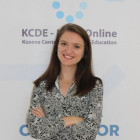Presentation Panel
Digital Transformation in Higher Education: Bridging Divides and Leading Change
Date Thursday, Dec 4 Time – Room: Bellevue
Digital transformation in higher education is not only about technology but also about culture, leadership, and purpose. This panel examines how universities can overcome structural barriers, embrace new ways of working, and redefine what curriculum transformation really entails. It also considers how to bridge digital divides so that technology enhances rather than obstructs learning. Together, the presentations outline both strategic and practical approaches to ensure higher education leads meaningful and sustainable change.

Anne Prill
Project Manager, CHE Centre for Higher Education Development
Anne Prill has been project manager for the Higher Education Forum on Digitalization at the CHE Center for Higher Education Development since 2017. As a transformation designer, she is primarily responsible for the topics of “future-oriented learning spaces” and “new work at universities.” She publishes HFD working papers and articles and gives keynote speeches at various events. She also initiated the HFDlead tandem program, in which she brings together university management teams from across Germany to exchange ideas and experiences.
She studied business administration at the University of Sunderland and economics, European politics, and law at the Technical University of Applied Sciences in Wildau. While working, she also completed her master's degree in adult education at the Technical University of Kaiserslautern. Since September 2024, she has been a certified systemic transformation coach.

Antigona Uka
PhD Candidate at CEU and Executive Director at KCDE (Kosova Center for Digital Education), Central European University
Antigona Uka is a PhD candidate at the Central European University (CEU) Doctoral School of Political Science, Public Policy, and International Relations. Her research interests include digital education policy, digital transformation in education, online teaching and learning, and ICT policy development. She is the founder and serves as executive director at the Kosova Center for Digital Education (KCDE), while occasionally serving as a digital education expert for the World Bank and UNICEF.

Bernd Schenk
Senior Lecturer, University of Liechtenstein
Bernd Schenk is a senior lecturer for Business Administration and Information Systems and the Academic Director of the BSc programme in Business Administration at University of Liechtenstein.
Bernd has worked as a consultant with different companies in the field of ERP systems and E-commerce and served as a trainer for SAP SE in the ASG region. He was a guest lecturer at different universities, including the University of Barcelona, Tongji University, Shanghai, and University Nettuno, Rome. Furthermore, he is a certified facilitator for Design Thinking and a TLS alumni of D.School at Stanford University.
Moderator

Achim Schmitt
Dean, EHL Hospitality Business School
Achim joined EHL in 2013. He holds a PhD from the University of Geneva and obtained a Habilitation at the University of Paris-Dauphine in France.
Before moving into academia Achim worked in strategy consulting, gaining substantial knowledge in strategy formulation and managing underperforming business situations. His research focuses on organization theory and strategic management, with particular interest in organizational decline, corporate turnarounds, and strategic renewal.
Academically, Achim has gained experience at the University of Geneva and the University of St. Gallen (Switzerland), Collège des Ingenieurs (CDI) in Paris and Audencia Business School in Nantes (France), China Europe International Business School (CEIBS) in Shanghai (China), Columbia Business School in New York (USA), and the Universidad de los Andes in Bogotá (Colombia). Achim is a member of the China Europe International Business School (CEIBS) Swiss Advisory Council and currently holds one board membership in the private sector.
New Work beyond Hype: Leading Universities into Transformational Change, Anne Prill
New Work offers innovative approaches to connect traditional institutional structures with a new dynamic work environment. My presentation highlights key areas, exploring the potential of New Work for higher education organizations. We‘ll discuss and reflect on transformation processes, and create new perspectives for the "future of work" at universities.
Institutional Change, ICT Policies, and Global Influences in Western Balkan Higher Education, Antigona Uka
This research explores the paradox of limited digital transformation in Western Balkans higher education, despite strong policy support and considerable investment. Using a sequential mixed-methods design, the research aims to examine institutional, organizational, and individual factors shaping resistance and pathways to digital innovation in HEIs.
The Digital Divide - Rightsizing Digital Learning Opportunities to Improve Learning Performance, Bernd Schenk
This presentation explores the challenges teachers encounter when transitioning to technology-enhanced learning environments in the classroom. Using the Design Thinking approach, participants will identify specific obstacles and develop tailored solution strategies for their own teaching contexts.